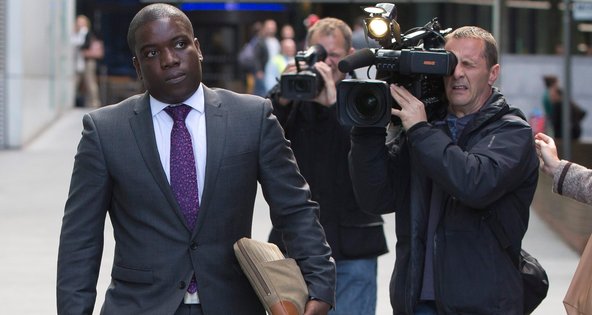 Neil Hall/ReutersKweku M. Adoboli, leaving court in London, has pleaded not guilty to false accounting and fraud charges.
Neil Hall/ReutersKweku M. Adoboli, leaving court in London, has pleaded not guilty to false accounting and fraud charges.
LONDON — Fictitious trading and brazen gambling by a single individual could have brought down the Swiss financial giant UBS, a British prosecutor said on Friday at the trial of a former bank employee accused of causing a multibillion-dollar trading loss.
That thesis is at the heart of the case against Kweku Adoboli, a former UBS trader in London who faces four counts of fraud and false accounting in connection with a $2.3 billion loss at the Swiss bank. He has pleaded not guilty to the charges.
In their opening statement, prosecutors portrayed Mr. Adoboli as a free-wheeling trader who doctored documents, invented profits and fabricated clients to cover up his rogue activities. Sasha Wass, the lead prosecutor, told a jury that Mr. Adoboli was motivated by greed and ego as he looked to increase his salary and status at the bank.
Related Links
At one point, the former UBS trader had $12 billion on the line, according to prosecutors. Those activities, the jury heard, threatened the bank’s health.
“The scale of Mr. Adoboli’s gambling was so large and unchecked, he could quite easily have approached and even exceeded the limits of the bank’s resources,” Ms. Wass said in the Southwark Crown Court. “He was a gamble or two away from destroying Switzerland’s largest bank for his own benefit.”
Prosecutors previewed their case before a packed courtroom in central London. During the nearly five hours of opening statements, Mr. Adoboli, in a gray suit and purple tie, sat quietly, surrounded by lawyers, while several of his friend listened in the courtroom.
If convicted, Mr. Adoboli could face up to 10 years in prison. The trial is expected to last eight weeks.
The case has been a black eye for UBS. After discovering the trading loss, Oswald J. Grübel, who had been hired to lead a turnaround at the bank, stepped down as chief executive. The co-chiefs of global equities, the division where the loss occurred, also subsequently left UBS.
On Friday, prosecutors said Mr. Adoboli took pains to evade internal controls.
According to prosecutors, the former UBS trader, who focused on a plain-vanilla version of derivatives trading, falsified trades valued from $5 million to $20 million. Mr. Adoboli even created separate accounts, which he called his “umbrella,” to hide the profits and losses of his unauthorized activities. In 2009, the so-called umbrella held $30 million, according to the prosecution.
At first, the tactics paid off.
The former trader had earned a combined $90 million profit for both UBS and its clients by May 2011, prosecutors said. Mr. Adoboli’s salary rose tenfold, to £350,000 ($569,000) between 2006 and 2010, according to the prosecution.
Despite the early gains, Mr. Adoboli’s trades started to go bad last summer as the world’s financial markets grappled with the European debt crisis.
By June, the former trader had exceeded his trading limit by $1 billion after creating a series of fictitious trades, the prosecution said. His investments had risen to $5 billion as of August, and Mr. Adoboli posted a $1.8 billion loss on the activity, which he also hid through false accounting, Ms. Wass told the jury.
The unauthorized trades left the Swiss bank at risk. In an internal investigation, UBS found that the reported risk of Mr. Adoboli’s activity totaled $1.5 million by mid-September 2011, according to prosecutors. In reality, the financial risk stood at $8.1 billion.
“Mr. Adoboli had ceased to act as a professional investment banker and had begun to approach his work as a naked gambler,” Ms. Wass told the jury.
Last August, risk managers at UBS began to ask questions about his positions. William Steward, an accountant at the firm, challenged Mr. Adoboli several times about discrepancies in his trades, Ms. Wass told the jury.
After the bank raised further concerns, Mr. Adoboli walked out of UBS on Sept. 14 and wrote an e-mail to Mr. Steward that the prosecution referred to as a “bombshell e-mail.” In the note, Mr. Adoboli said his recent trades had not been hedged, leaving the bank exposed to potential multibillion-dollar losses. Ms. Wass said that in the e-mail, the former UBS trader initially said he had acted alone, though he later claimed that some of his colleagues were aware of his actions.
“Although I had a couple of opportunities to unwind the long trade for a negligible loss, I did not move quickly enough,” Mr. Adoboli wrote to UBS executives. “I take full responsibility for my actions and the stilt storm that will now ensue.”
After senior managers received the e-mail, they demanded Mr. Adoboli return to the London office to explain his actions.
In a series of meetings that lasted until the early morning on Sept. 15, UBS executives peppered Mr. Adoboli with questions about his trades. During the discussions, the former trader admitted that he had first falsified records in 2008 after making a $400,000 trading loss, according to the prosecution. Mr. Adoboli said that he had concealed the losses in the hopes of recovering the money through future trades.
“The bank cannot be faulted for trusting him,” Ms. Wass told the jury. “They respected him, and he abused their trust to cheat them for his own eventual gain.”
Article source: http://dealbook.nytimes.com/2012/09/14/as-his-fraud-trial-opens-ex-ubs-trader-is-accused-of-brazen-gambling/?partner=rss&emc=rss
